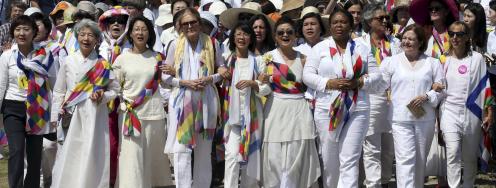The Bulletin of Atomic Scientists recently set the Doomsday Clock ahead 30 seconds, 2 minutes to the proverbial 'midnight' signifying the end of humanity as we know it. This 30‑second move from last year, sets the clock as close to midnight as it has been since 1953, after the Soviet Union and the United States first tested thermonuclear weapons.
The "Doomsday Clock" is a communications device with which Bulletin of the Atomic Scientists have measured global threats since 1947. Although the Doomsday Clock originally measured the threat of global nuclear war, since 2007 it has measured nuclear risks and climate change equally and takes into account emerging technologies. However, according to its president and CEO, Rachel Bronson, "the nuclear landscape takes center stage in this year’s Clock statement."
The last year was marked by significantly increased nuclear threats, including astonishing progress in North Korea's nuclear weapons program and President Donald Trump's incendiary and personal remarks on Twitter to North Korean leader Kim Jong-un, in which the US president explicitly, and with ambiguous conditionality, threatened the North Korean regime with nuclear weapons.
Ploughshares Fund is working to eliminate the dangers of nuclear weapons — no matter where they come from. We do this through support of initiatives to foster peaceful resolutions to nuclear crises, investment in organizations specializing in nuclear weapons policy and activism, and promotion of timely, fact-based analysis from the best and brightest minds working on nuclear issues. We believe it is important to expand the conversation around nuclear weapons, and we strive to take our message around the country, and the world.
On January 25, 2018, the Juneau World Affairs Council presented an educational seminar titled "North Korea, Bellicose Tweets and Other Nuclear Challenges We Face" at 360 North and KTOO Public Media studios, whose video is above. The speaker, Philip Yun, helped conduct US-North Korea diplomacy in the State Department during the Clinton administration. He gave a similar talk at the University of Alaska Southeast. He is our executive director.
Originally from Ohio, Yun is the son of Korean immigrants; his mother was born in what is now North Korea, and his father was born in what is now South Korea. As a seasoned expert in foreign affairs with decades of experience on North Korea and nuclear issues, Yun has unique insight into the current North Korea crisis and what must be done to rectify it. At these events Yun offered his take on recent developments on the most pressing nuclear issues, focusing specifically on President Trump's 'Nuclear Button' tweets, and what they meant for efforts to de-escalate the North Korea nuclear crisis. His entire Juneau World Affairs Council presentation can be seen above.
We are 2 minutes to midnight, but there is still time to turn back the clock. We believe people should take that time and become educated on nuclear weapons issues and get involved. Nuclear war is not like other issues of war and peace — avoiding it is most actionably related to policy choices, much like the issues of health care or immigration. People need to speak up, not duck and cover. In these times of increased instability and escalatory rhetoric, it is important to be actively involved in creating a world free from nuclear threats. The first step is to inform yourself.
Enjoy the video presentation and learn more about our work to reduce nuclear threats. Sign up today to get informed. Signing up is the best way to begin, or continue, to contribute to peace and security around the most dangerous weapons ever devised, until they are eventually eliminated.
Photo (on social media, open graph and Twitter card): Closer view of Mendenhall Glacier in wintertime. Frozen Mendenhall Lake in foreground. The glacier has recently come to the forefront of the international debate on global warming. Photo credit Wikimedia / unknown (cc)



